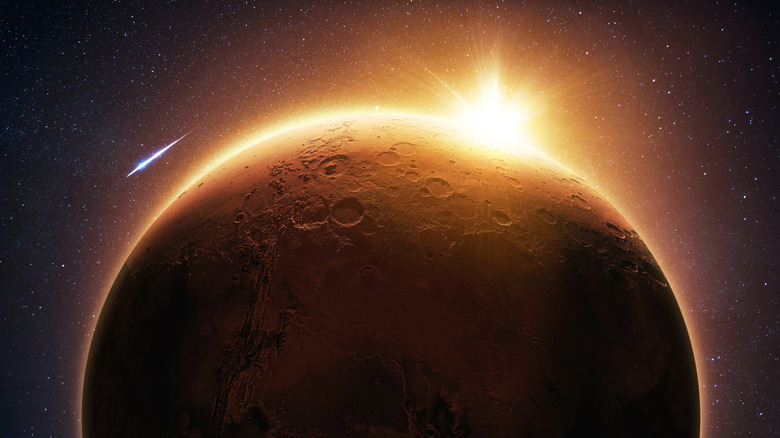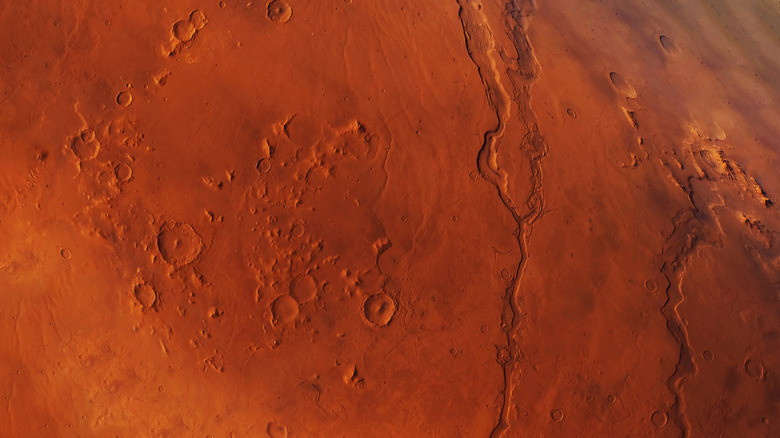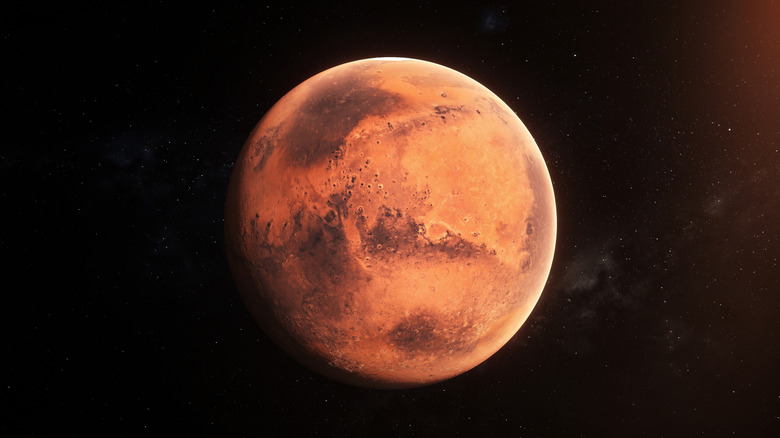The Painful Reason Mars Would Be One Of The Worst Planets To Die On
We haven't quite reached the point where the human race is actually establishing colonies on Mars, but such a thing seems more likely than ever. That's not just because of the efforts of companies such as Space X, which aims to establish a self-sufficient city on the red planet, but because we're learning more about Mars all the time, and the more we learn, the more familiar that particular world seems. In fact, Mars has quite a lot in common with Earth, and is one of the most explored planets in our solar system. It is thought to have hosted life at one point in its long history, back when its surface was covered in rivers and lakes. That means an exciting secret could be held within Martian ice, as a 2024 NASA study published in Communications Earth and Environment suggested that life in the form of microbes might still be present deep beneath the surface of the planet.
With all that in mind, you might think that Mars was pretty much ready to be colonized already. Alas, the fourth planet from the sun is inhospitable to life for several reasons. Mars has an incredibly thin atmosphere and nowhere near enough oxygen to sustain us humans. In fact, the density of oxygen on Mars is roughly 1/10,000th of that on Earth, with 500 times more CO2 than oxygen. As such, we literally wouldn't be able to breathe on the surface, which in and of itself isn't exactly an oasis. Mars is a dusty, cold desert of a planet, where temperatures can reach as low as negative 225 degrees Fahrenheit. As such, Mars isn't somewhere you'd want to visit without the proper protections, as dying on the surface of this unforgiving planet would be nothing short of horrific.
The Martian atmosphere is lethal to humans
From dust storms to temperatures well below freezing at its poles, the red planet isn't some sort of sanctuary just waiting for us to arrive and flourish on its abundant surface. Were we to step onto the planet without a space suit, it would be a truly horrible experience, mostly due to the vast amounts of carbon dioxide in the atmosphere.
Earth's atmosphere is ideal for humans. It's made up of around 78% nitrogen, 21% oxygen, 0.9% argon, and 0.1% other gases. There are just trace amounts of carbon dioxide (along with traces of methane, water vapor, and neon). Mars, however, has a very thin atmosphere that is made up of 95% carbon dioxide, 3% nitrogen, 1.6% argon, and has trace amounts of carbon monoxide, water, methane, and oxygen. Yes, on Mars our precious oxygen is just a trace element in the atmosphere. But this lack of oxygen isn't what would make dying so distressing on Mars, as it turns out all that carbon dioxide is particularly nasty when it builds up in the blood.
Jennifer Glass, associate professor at the School of Earth and Atmospheric Sciences & Biological Sciences at the Georgia Institute of Technology, lent her expertise to Newsweek, explaining how some gasses, such as helium or nitrogen, cause individuals to lose consciousness very quickly — within a matter of seconds. In these instances, there's no sense of breathlessness, which means death would be relatively painless and quick. A build-up of carbon dioxide in the blood, however, results in the sensation of breathlessness, which would make dying this way a lot more distressing.
Mars could kill you in a variety of horrible ways
Just in case you were thinking dying on Mars wasn't already sounding horrific enough, the red planet has multiple other ways to facilitate your painful demise. Even before the carbon dioxide build-up gets you, it's much more likely you would die in an arguably even more upsetting way on the surface of Mars. The atmosphere on the planet is thin enough that it can't keep in heat from the sun very well at all, which means that if you were to stand on the equator of the planet at noon, it would be about 75 degrees Fahrenheit at your feet and 32 degrees at your head. Kind of neat, right? What isn't quite as neat, however, is the fact that the same thin atmosphere would result in a very painful death. As Dr. Pascal Lee with the SETI Institute explains, the low atmospheric pressure on the planet would likely be the first thing to get you, as the gasses in your blood would bubble up and you would "fizz to death" within seconds.
Just in case this wasn't a horrifying enough scenario already, how about the fact that all of this would happen in eerie silence? Any fan of Ridley Scott's "Alien" will know the famous phrase, "In space, no one can hear you scream." As it turns out, something similar is true of Mars, where our voices — and sound in general — behave very differently. Much of this also has to do with the abundance of carbon dioxide in the atmosphere, which absorbs any sound higher than most voices, such as whistles. Were you to scream as you died a slow and agonizing death on the red planet, then you'd likely make very little sound at all, even as you were overcome with a feeling of breathlessness and your blood boiled. Let's hope Space X has a solid plan in place to deal with such issues when it's finally time to make the trip to Mars.


